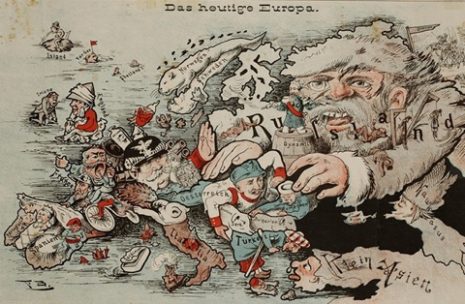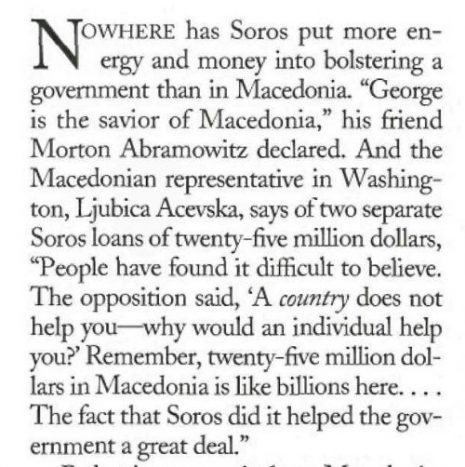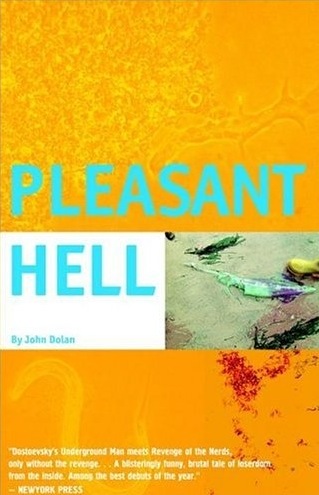
Last week, protesters stormed Macedonia’s parliament injuring over 100 people, among them almost a dozen members of the new ruling parliamentary coalition. The ostensible reason was the naming of an ethnic Albanian in the majority Slavic Eastern Orthodox country—but others had even simpler explanation.
“Macedonia ‘at risk from Russian meddling’”—the Sunday Times screamed, describing the protesters who stormed parliament as “pro-Kremlin thugs.” The Economist blamed the violence on “a party backed by Russia” while the Washington DC think-tank CEPA—funded by the Pentagon and an A-list of military contractors—warned about “Russia’s New Offensive in Macedonia” while on social media, former journalist Maxim Eristavi tweeted,
“Russian fingerprints are all over this dangerous mess in Macedonia. Russia-controlled media are in full hysteria mode inciting ethnic hatred”.
Indeed.
We just did a Radio War Nerd interview with the editor of the Balkanist, Lily Lynch, who’s spent the last several years living in Skopje, the capital of Macedonia, and in neighboring Serbia, and who found this outburst of “Russia did it!” not just wrong, but dangerously stupid.
Local politics anywhere in the world are incredibly messy and complicated and often times just plain stupid-crazy — all the more so in a compressed region like the Balkans— and trying to superimpose a simplistic DC-oriented Cold War narrative, blaming local problems on that dastardly alien villain, Ming The Merciless, is just fake news for respectable people. The real story is messy, granular, more local than you’d care to know, mostly involving Macedonia’s political parties, their constituencies and the meager spoils between them. There is some outside meddling—from Macedonia’s larger neighbors (Greece, Albania, Kosovo, Serbia, Bulgaria) from the EU and the US (which strong-armed the corrupt center-right party VMRO into calling early elections last December). Even George Soros has meddled in Macedonia in the past, though his influence there has waned considerably, just as local hysteria over Soros’ influence has reached fever pitch.

Excerpt from a 1995 New Yorker profile on Soros
The best quick summary of last week’s events, according to a lot of people familiar with the region I talked to, is this piece by Dimitar Bechev—“What Is Happening in Macedonia? It’s not an ethnic conflict, and it’s not Russia’s fault”. As Bechev and Lynch and others tell it, there really isn’t a good guy or a bad guy in this power struggle. It’s more like what the detective says in Zero Effect: “There’s just…a bunch of guys.”
The deeper you dig into the minutiae of Macedonian politics, the harder it is to then retell that story to a foreign audience. Which is one reason why it’s easier for a writer/editor to blame the mess on Putin, or on Soros, or on “ethnic tensions” between the majority Orthodox Slavs and the minority Muslim Albanians. Not only does that simplify the narrative, but it also appeals to built-in audiences—particularly audiences with resources that could be useful for Macedonians in their domestic political struggles. The audience for blaming “Putin” is the EU, NATO, and Washington, whose resources the opposition SDSM party has been leveraging to retake power; the audience for blaming “Soros” includes American neocons and Republicans in Congress, who’ve been backing Macedonia’s corrupt center-right VMRO party. So you have GOP Senators led by Mike Lee and Ted Cruz writing open letters to Tillerson demanding an end to the liberal Soros-State Department plot against Macedonia’s center-right government, because VMRO has convinced some Republicans that Macedonia’s problems are really a proxy war between American liberals and conservatives; and you have others publishing in the Washington DC insider rag, The Hill, warning “GOP Senators, Don’t Side with Russia on Macedonia”—again falsely painting the domestic political fights as an extension of our own.
The point is that these simplified, superimposed framings serve a political lobbying purpose—as well as dumbing down the story to make it easy for dumb-dumbs to read. Sleazy and stupid—that’s how DC likes ’em.
And then there’s always Dana Rohrabacher, the Ur-rightwing hippie from the beaches of Orange County. Rohrabacher’s contribution to this mess came a couple of months ago, when he told an Albanian TV interviewer that Macedonia wasn’t a real country, and that it should be divided up between Albania and Bulgaria—which didn’t go down well in Macedonia. If Rohrabacher put any thought into that comment at all, he was just pandering to his Albanian audience. That’s a big if—considering this is the same guy who once dressed up in drag calling himself “Diana” to visit Sirhan Sirhan in prison, to “solve” Sirhan’s 1968 assassination of RFK.
And yet even this stupid sleazy Rohrabacher story calling for the dismantling of Macedonia couldn’t be reported without somehow pinning it all on Putin. Foreign Policy wrote that of course Rohrabacher would try to destabilize the Balkans—after all he was “once called ‘Putin’s favorite congressman'” [which links to a headline in Politico, the same outlet that still claims Putin offered Poland to carve up Ukraine, a story whose only source, Radislaw Sikorski, retracted it, leading all the other media to issue retractions on the fake news story—except of course Politico]. The Independent just flat-out lied, taking a warning by Lavrov that outside powers were trying to break up Macedonia, which Russia opposes, as an endorsement by Lavrov of that plan:
Mr Rohrabacher’s comments echo a suggestion by Russian Foreign Minister, Sergey Lavrov. In 2015, he said that “ideas have been floated” about giving the Republic of Macedonia “to Albania, and another part to Bulgaria”.
You can tell by the weird carve-up of Lavrov’s quote that something’s wrong here—and something is wrong. Lavrov was actually arguing that Macedonia was being pressured by its neighbors and the EU to join sanctions against Russia, and being threatened with dissolution if they didn’t obey. This is hardly an endorsement; it’s just crude quote-chopping to fit a pre-ordered New Cold War narrative. But hey, who’s got time to fact-check?
We’re seeing this same superimposed narrative, with Russia as the useful foil, in a lot of places these days. In Albania, opposition protesters have been holding a Maidan-like tent city protest in front of the prime minister’s office since February, demanding fresh elections. A little over a week ago, they vowed to “radicalize” the protests and bring transport to a standstill. So the prime minister, Edi Rama, is doing what a lot of politicians do—turning up the nationalism heat. A couple of weeks ago, Rama warned that Albania would merge with Kosovo, forming the dreaded “Greater Albania,” if EU talks didn’t go their way. Rama also heated up tensions in Macedonia by making sure every Macedonian knew he was exerting some influence over Macedonia’s Albanian political parties. This plays well with Albanian voters, but creates new problems for Rama in Washington and Brussels. So, on point, Albania’s foreign minister flew to Washington late last month warning that Albania was all that stood in the way of the Russian bogeyman.
And then in neighboring Montenegro, going into last October’s elections, the leader of the ruling party since 1991 accused Russia of financing Montenegro’s opposition parties, and then claimed to have busted a plot by Russian and Serbian nationalists to assassinate him. The Pulitzer team at the New York Times has regurgitated this line hook and sinker—the theory being that Russia is trying to destroy Montenegro’s independence and democracy in order to stop it from joining NATO.
Which would perhaps be plausible, but for a few things: First, the Montenegrin leader who claimed he was the target of the Russian assassination plot, Milo Djukanovic, is one of Europe’s leading mafia gangsters, a former Communist Party boss who ruled Montenegro like a Central Asian autocrat since 1991 (he just formally stepped aside for his anointed successor). In 2015, the OCCRP (Organized Crime and Corruption Reporting Project) named Djukanovic “2015 Man of the Year in Organized Crime” calling him “Europe’s last dictator” who “has built one of the most dedicated kleptocracies and organized crime havens in the world.” Djukanovic was indicted by Italian prosecutors for heading a billion-dollar cigarette smuggling ring with the Italian Mafia, in a crime wave that included numerous assassinations— including of investigative journalists. Ultimately Djukanovic was granted diplomatic immunity—many suspect he worked out a deal with western powers to move Montenegro into NATO in return for immunity. Another problem with this neat framing is that NATO has never been popular in Montenegro. Why? Because NATO bombed Montenegro in 1999, during the Kosovo War. Djukanovic understood what the polls were saying, which is why he refused to hold a popular referendum on the issue. Instead, he and the Montenegrin media beat the “Russia is undermining Montenegrin democracy [sic!]” drum to divide and conquer—and last month, Montenegro’s parliament voted to join NATO, with just under half the parliament members boycotting the vote.
And now DC insiders have figured out how to use this spin on a new front, Afghanistan. This is where the New Cold War framing gets serious. I’ll talk more about that shitshow tomorrow.
Mark Ames is co-host of the Radio War Nerd podcast with Gary Brecher (aka John Dolan). Subscribe here.
Read more:, Mark Ames, Russia Blog


Got something to say to us? Then send us a letter.
Want us to stick around? Donate to The eXiled.
Twitter twerps can follow us at twitter.com/exiledonline















6 Comments
Add your own1. Slappy Butthole | May 5th, 2017 at 8:44 pm
Good stuff as always.
Small countries have a habit of playing shitty games like this with the larger powers. During the actual cold war they were always trying to get weapons and money by causing a panic that the commies were just about to rise up or invade. Interestingly, I recall reading that the Soviets had the same problem: clients milking the empire for all the goodies they could, then getting cold feet when it came time to repay favors.
Stuff like this is kind of entertaining until it isn’t, in a, “oops we accidentally started WWIII” sort of way. It wouldn’t be so bad if our idiot press and politicians didn’t take it all at face value and all so seriously. Here’s hoping that the fatal mistake never comes.
2. see mo gersh | May 5th, 2017 at 8:59 pm
Fck yah. Love this blog.
3. le neocon | May 6th, 2017 at 10:43 am
Mark Ames grasps at straws trying to prove that a situation is “””complicated””” (or in other words: “Russia is not so bad, you’re being a Manichaean!!!!”). Duh their fingerprints are all over this shit, why would they be backing VMRO so bad?
4. Galtic Warrior | May 6th, 2017 at 10:06 pm
Mark Ames, I have failed! Do you remember how you used to mock me in the comments here???
Well WHOS LAUGHING NOW?! Guess who’s joining ICE???
I’m watching you. I’m always watching you! And when the time comes, I’m TURNING you in!.
5. DrunktankDan | May 7th, 2017 at 10:29 pm
“The Truth is often stupid.”
-Bender Rodriguez
6. et Al | May 10th, 2017 at 11:16 am
It’s good to see you back here!
First of all, thanks for the Balkanist link.
Secondly, I’ve had the ‘Russia meddling’ regurgi-prop from someone who should know better, but that is how propaganda works. Still, when it comes up with others, I pull up a map of the Balkans and tick off every NATO member state that surrounds Serbia & Macedonia.
I might even point out (to the same persons) that whatever you think about Russia, it directly helps in a significant way only those who actually want to help themselves, whether in Syria or Ukraine. For Serbia, they do it for shits and giggles as it doesn’t matter who is in power, they always give in to Berlin in the end.
Leave a Comment
(Open to all. Comments can and will be censored at whim and without warning.)
Subscribe to the comments via RSS Feed